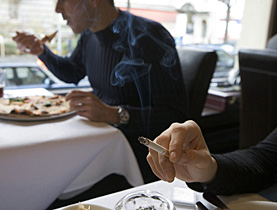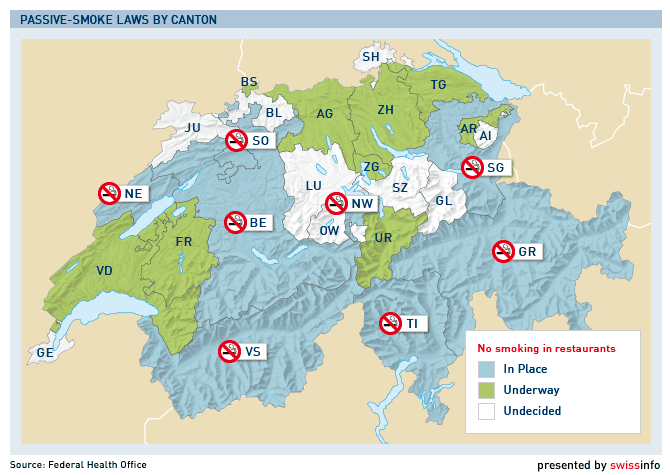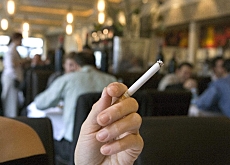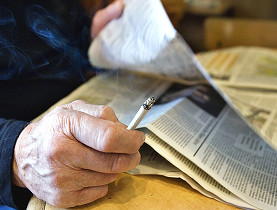Initiative aims to stub out smoking nationwide

A coalition of 40 health organisations has launched an initiative to ban smoking in all buildings open to the public across Switzerland.
About half of the country’s 26 cantons already have rules regulating smoking in bars and restaurants, but proponents of the campaign say the country’s laws are too disjointed and do not go far enough.
“We have a very peculiar situation in Switzerland,” Otto Piller, president of the Swiss Lung League, told swissinfo.ch on Monday. “The way it is now, you can have a town that sits on the border between canton Solothurn, which forbids smoking, and canton Aargau, which does not, meaning half the town allows smoking and half does not. It’s an impossible situation.”
The new law, if passed, would make any room open to the public smoke free, including those in restaurants, bars, schools and hospitals. Workplaces would also ban smoking inside. The regulations would cover all of Switzerland.
The alliance, which includes groups like the Swiss Cancer League, numerous medical groups and worker associations like Travail.Suisse, has until November 2010 to collect 100,000 signatures needed to force a nationwide vote on the issue.
Doing so should not present any problems, proponents say, because much of the Swiss population already supports moves to make areas smoke free.
According to a survey of 640 people by the research and marketing firm DemoScope, the initiative would pass overwhelmingly with a 68 per cent majority if residents were asked to cast their votes today.
“The will is there,” Piller said. “The people want this.”
For and against
The “people” do not include those like Walter Sachs.
While a group collects signatures for the initiative a few blocks away, Sachs tugs on a Parisienne inside the Café des Pyrénées, a cozy Bernese coffeehouse frequented by smokers and bookish intellectuals.
Sachs, a regular customer, says he understands why people want to protect the health of restaurant employees, who sometimes breathe more than a pack a day in second-hand smoke. He does not however believe a nationwide ban is the way to do it.
“What they are doing is completely undemocratic,” Sachs said. “They should allow the restaurants to decide. Each place should be able to find a solution that works best for them.”
That is precisely what Cesari Inor, owner of the chic Cesary bar just across the street, did about three years ago.
A smoker himself, Inor says he decided to allow smoking only during the evenings and only in portions of the bar. As a result, he said more young parents with children would come during the day during smoke-free hours while customers in the evenings could still smoke.
“We had many customers who were pleased,” he said. “Of course if the government said we have to be smoke free, we’d be smoke free.”
Personal freedom?
On a nationwide level, parliament last year approved a limited ban that allows for smoking rooms, or fumoirs, in some restaurants. Cantons reserve the authority to make tighter rules, which often consider the size of an establishment. In most cases, places under 80 square metres can allow smoking.
The result has been a patchwork of regulations that vary greatly from region to region. Cantons like Uri, Basel Country and Valais recently backed tougher measures to ban smoking in public places while voters in canton Thurgau rejected them.
Initiative backers say there are too many loopholes in calculating the size of an establishment and that the hodgepodge approach also creates too much confusion, especially in cases where smoke-free cantons abut others with less strict regulations. A countrywide ban would solve the issue without giving some businesses advantages over others, they say.
“We do not want to ban smoking but protect people from the health effects of passive smoke,” said Erika Forster, a Radical Party senator from St Gallen who helped launched the initiative.
“Our personal freedom stops where our behaviour harms others.”
Tim Neville, swissinfo.ch
The effects of second-hand smoke has not been studied as well as the effects of smoking in general, but one study led by Swiss scientists is attempting to shed new light on passive smoke.
The Swiss Study on Air Pollution and Lung Diseases in Adults (Sapaldia) is an ongoing study that for the past 15 years has looked at the effects of particulate matter on lungs and cardiovascular systems.
It found that smoking establishments have on average eight times as much particulate matter in the air than smoke-free places. Some bars had as much as 33 times normal levels.
73% of Swiss do not smoke, up from 67% in 2001.
Cigarette smoke contains more than 4,000 substances, including arsenic, cadmium, lead and radioactive polonium.
Thierry Carrel, a cardio-vascular surgeon in Bern who operated on Finance Minister Hans-Rudolf Merz following a heart attack last year, noted that an aggressive law against smoking in public spaces in Italy has produced significant results.
In Rome the number of heart attacks has dropped 11% for people aged 35-64 since the law passed in 2005. Similar results were found in other areas with smoking bans, including Ireland, Scotland, France and the United States.
Were the same measures to be introduced in Switzerland, Carrel says the country could expect upward of 3,300 fewer coronary events like heart attacks each year.
Switzerland currently has more than 100,000 workers in restaurants, cafés and bars who are exposed to passive smoke. Even if they are not smokers themselves, the employees will inhale smoke from the equivalent of 15-38 cigarettes.
Laws now state that waiters and waitresses only have to serve people in smoking rooms, or fumoirs, if they do so voluntarily. But Erika Foster, a St Gallen senator, says most employees must agree to work in such rooms or risk losing their jobs. The new initiative seeks to close loopholes like that one and bolster workers’ rights with a blanket ban.


In compliance with the JTI standards
More: SWI swissinfo.ch certified by the Journalism Trust Initiative



You can find an overview of ongoing debates with our journalists here. Please join us!
If you want to start a conversation about a topic raised in this article or want to report factual errors, email us at english@swissinfo.ch.